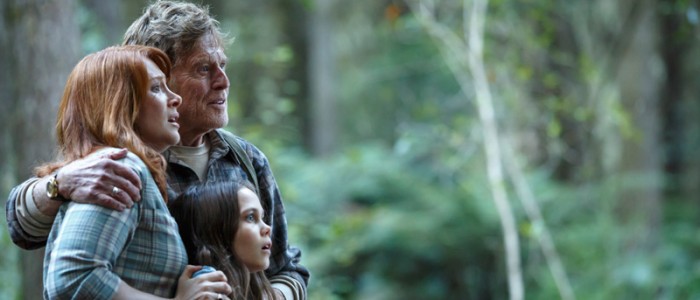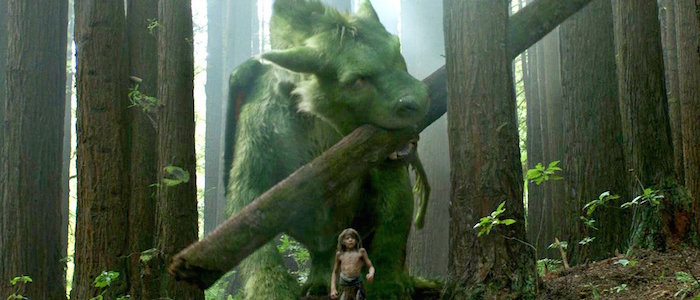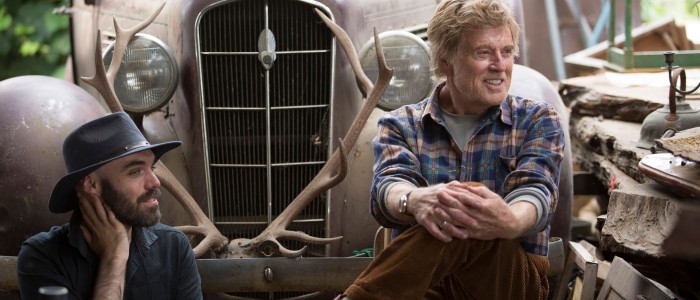Interview: 'Pete's Dragon' Director David Lowery On Not Reading Reviews And The Toughest Days On Set
David Lowery's Pete's Dragon is a simple, beautiful and warm tale of friendship. It's a refreshingly sparse story that hardly resembles the original Disney film. Lowery and co-writer Toby Halbrooks lifted very little from the '77 musical; they made a movie that stands on its own and doesn't rely at all on nostalgia.
The film was well received when it was in theaters, but now that it's on home video, more viewers will likely embrace Elliot and Pete's heartfelt and tender adventure. With Pete's Dragon now on Blu-ray, we recently had the chance to speak with Lowery again, and he reflected on some of the toughest and most enjoyable days during the shoot, not reading the reviews, the lessons he learned, and the experience of working with Robert Redford again.
Below, read our David Lowery interview.
It's been a few months since Pete's Dragon opened in theaters and audiences saw it. Now that you have some distance from the film, how do you feel about it?
I'm feeling really good about it, but I also feel that it's in the rearview. It's weird how quickly that happens. When we last spoke, it was right in the rush of getting the movie out there and finishing it, because we were still finishing it at that point, I think, or had just finished it. I still had to go in and do all the Blu-ray color correction and things like that, and the commentary. There were still things being done at that point, and still so very present. Then, suddenly, it opened, and it was in the rearview mirror almost immediately.
I've worked longer on this movie than I have anything else I've made. Just to have it all of a sudden be turned over to the world, for better or worse, and let people see it, at that point, my job is in some ways done, because there's nothing else I can do. For me, it's important to sort of disengage, and to sit back, and to just let it go. I don't watch it. I won't watch it again, I'm done watching it. I don't read the reviews; I sort of let it be its own thing. I am, however, very happy to talk about it, so here we are today.
Have you always not read reviews of your work?
No, I obsessively read reviews for my last film and realized that it does me no good whatever. I love film criticism as an art. I think it's a very important thing. A lot of filmmakers don't like it, but I love it. I think it's a very valid medium in and of itself, and I used to practice it myself as well. I think that the lesson now as a filmmaker, it's important to me to not pay attention to those things, to the reviews, and to the criticisms... the good ones or the bad ones, because I get too caught up in it. I take it too personally, whether it's good or bad. In the end, no good comes of it, really. If I read a good review, it makes my day a little better, and that's great, but I already feel pretty positive about the movie. So it's like I'm feeling pretty good about the movie already. I don't need necessarily to read the good ones, I'm very appreciative of them.
If I read a bad one, a negative review, I'm just going to think about it for a week, and it'll keep me up all night, and I'll start to agree with it, or I'll start to wonder why I didn't fix that one problem that someone called me out on. I did that in the last film, and it kind of contributed to a severe drop in my mental health for about four months. So I was like, you know what, next movie I make, I'm not going to read them. In June, I disengaged from Twitter, so I couldn't be paying attention to it, and just tried to separate myself from that part of the movie's release, because my job is to make the best movie I can, and your job as a critic and all the other critics is to watch it and process it and bring your own perspective. Your perspective is valid, and I'm really glad that you like it. [Laughs] It's everybody's opinion, it's up to them, and I don't want to let that get in the way of me moving on to the next film, and I don't want that to affect how I feel about what I've made.
 As you said, the movie's kind of in the rearview now, but now when you stop and think about Pete's Dragon, are there certain memories that immediately come to mind for you?
As you said, the movie's kind of in the rearview now, but now when you stop and think about Pete's Dragon, are there certain memories that immediately come to mind for you?
Definitely. It's still very present in that way. I very frequently remember what I was doing this time last year. I think where we are now, last year I was in New Zealand to get a couple pickup shots, and that was a year ago. I'm just like, oh, this time last year, I was probably scouting a location for one of the pickup shots that we did. Or, I'll think about the time I spent in post-production and how all-encompassing that was, and how my schedule was so jam-packed. Right now, my life is sort of... I'm doing a lot of writing. I get up and sit in my pajamas on the couch all day and work on a script, and it's so different from where things were. I think about those things a lot. The memories that come to mind are all positive. It's so crazy how quickly the rose-colored glasses come on. Making the movie was tough and really difficult. It was fun, but very tough and exhausting, and very stressful, and it went on for a long, long time. There were plenty of days where I thought, man, Is this worth it? Am I cut out to be a director? I don't know.
Then, as soon as it's done, you automatically feel happy about everything, and all of the bad and good in hindsight, and you just romanticize it all in your head. There's no specific memory that comes to mind, but they're constantly there, they're constantly just floating around. I'm always just thinking about this or that little element of the production. Especially now that I'm writing the next couple of films that I want to make, and I'm thinking about the lessons I learned on Pete's Dragon, and how they're going to play into all the choices I make in the future.
 Were there any particular days on set that made you question whether you were cut out to be a director?
Were there any particular days on set that made you question whether you were cut out to be a director?
You know, the first day that was really significant was when we were shooting the first scene of the movie. It was a little boy, young Pete, on the road after a car crash. That was day 20 or 21 of the shoot. Up until then, it had been pretty easygoing, and pretty fun. That was the first really difficult day, because, you know, it's a really delicate scene. We were dealing with a four-year-old who did not even understand what acting was, which is great. That's a really fun way to work. I love working with little kids who don't know they're in movies. You only have three hours to work with them, and we had a lot of things to get. It was a really challenging day, and if a four-year-old doesn't want to behave, he's not going to. If he doesn't want to make a movie or doesn't want to act, he's not going to. That was the first really, really difficult day. After that, it came fast and furious, [laughs] there was a lot of challenges, and sometimes it had to do with the locations, like getting to location was a process. Every day we'd drive about two hours to get to pretty much every location.
There are other things. There was weather, you know, and even the scene when Pete is talking to Bryce [Dallas Howard] in the bedroom, and she's having this big emotional moment with him, where they ultimately embrace. That was a really tough scene to shoot because the set was built in a warehouse that we randomly had to find a location to shoot that in and build the set very quickly. Because of the time we had to shoot it, Bryce wasn't able to do any of her takes with Pete — she had to do them all with a double. That was scary, because I don't know if any of the shots are going to match if the double's head is in the right space according to what Pete's coverage was. I didn't know if Bryce's performance acting opposite a completely different kid who wasn't actually acting would work, but she's amazing. She nailed it. That day ultimately yielded one of my favorite scenes in the entire film, but it was a real scary day. I didn't know if the scene was going to work, it's such a pivotal scene.
A lot of things like that, I'm sure it's pretty much par for the course for making any movie. They all always have those hurdles, but the big thing I learned on this movie is when you're making a big summer studio movie, it goes on longer, and those hurdles come far more frequently because the shoot just goes on for 80 days.
What were some of the key lessons you learned from Pete's Dragon?
One thing I think I learned was to really get the script in good shape. That was something that I hadn't done in the past. In the past, I'd been sort of a fan of writing a coat hanger of a script, and something I could hang ideas off of. It didn't have a lot of structure or a lot of... It didn't have tons of thought put into it. That's not to denigrate screenplays I've written in the past, but I definitely was drawn to the free form approach to filmmaking, and I saw the positive side of that, but also the negative side of it, with Ain't Them Bodies Saints.
With Pete's Dragon, I really learned how comfortable it can be to have a solid bedrock of a screenplay with a story that has been well thought out, and dialogue, and character motivations that are all there in very clear form, so that then when you get to the set, and you start working with the actors, you can build off of that, rather than showing up and not really knowing what it is you're going to do that day. I used to love working that way, and it was really fun, but I don't know if I ever quite pulled it off.
Working on Pete's Dragon, having the script that you're working on, and really taking care to get it right was great. But then we did do improvisation, we did kind of leave what was written behind, and take different avenues, and go in different directions, but, we always had the script to fall back on. That allowed the movie to maintain its shape and its cohesiveness, and everything fit together the way it ultimately did.
 You're about to work with Robert Redford again with The Old Man and the Gun. Maybe it's too soon to say, but what sort of performance are you hoping for from him?
You're about to work with Robert Redford again with The Old Man and the Gun. Maybe it's too soon to say, but what sort of performance are you hoping for from him?
I'm looking at the screenplay right now. I just wrote a line of dialogue, and that line of dialogue is, "How fast were you going?" I'm trying to think about, how is he going to say this? And what else do I need to add? It's fun having worked with him at this point because I kind of have a sense of him as an actor that I didn't have before I met him. Now, I can go back and look at his old movies and see the things that I recognize from my own production. I watched the Three Days of the Condor not too long ago, and I felt a lot of the kicks and the traits that he has that he still has. I was like, oh yeah, that's that thing that he does. Just being aware of those things, it allows me to write for him in a better fashion.
One of the things that I want to do with this movie as I'm writing it, this new draft of the script, is I want to lean into who he is, because I don't think there's any getting in the way from Robert Redford at this point, which we did a little bit with Pete's Dragon, as well. I wanted to lean into his power as a consummate storyteller, and he can hold captive an audience with his voice. With this film, I want to lean into his legacy. I want to lean into all the baggage that he brings with him as Robert Redford, and allow him to act and play a character, but also not shy away from just embracing who he is, and let this movie be, to some extent, just a tribute to him. He probably would not like hearing me say that. [Laughs] I think one of the things that's exciting about this project, but it was one of the things that was exciting about having him on Pete's Dragon, too, is that at this stage in his career, he is who he is. You can either cast him against type, or have him play a completely different character, or you can lean into what he does best, and in this case, and in the case of Pete's Dragon, that's what I wanted him to do.
***
Pete's Dragon is now available on DVD and Blu-ray.
